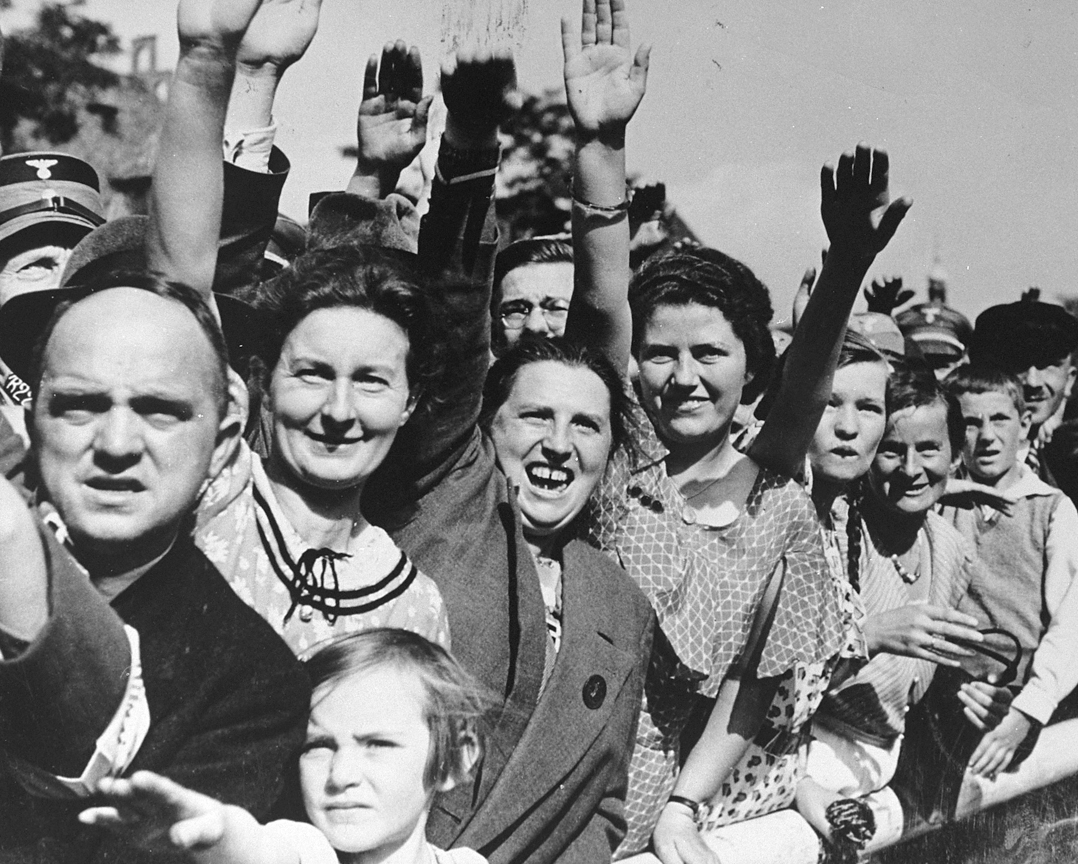Beyond America’s Borders: Fascism: Adolf Hitler and National Socialism
Printed Page 654 Chapter Chronology
Beyond America’s Borders: Fascism: Adolf Hitler and National Socialism
Fascism: Adolf Hitler and National Socialism

The Great Depression paralyzed economies around the globe and seemed to demonstrate that capitalism had failed. Individual working people and businesses could do little to restore prosperity. Only governments had the power to kick-start the economy. Many people believed that democracies such as the United States were too weak and divided to take the necessary steps.
President Franklin Roosevelt optimistically declared that the "democratic faith" of Americans in 1933 was "too sturdy" to turn to "alien ideologies like communism and fascism." But authoritarian, antidemocratic Communist and fascist parties battled to seize control of national governments across Europe. In Germany, Adolf Hitler and his fascist National Socialist Party, also known as the Nazis, came to power in 1933 and improved the economy while crushing democracy.
Hitler rose to power as the leader of a political coalition (composed of Nazis, other conservative parties, and the army) that sought to bring order to Germany in the years following World War I. Hitler stoked discontent by proclaiming his fantasy that an international conspiracy of Communists and financiers — mostly Jews — caused Germany's defeat and was responsible for its postwar woes. During the 1920s, economic distress and political turmoil increased support for Hitler's National Socialist Party among disgruntled veterans, farmers, residents of small towns, shopkeepers, artisans, and other members of the middle and lower-middle classes. The Nazis became the most popular political party by 1932, but they still commanded only one-third of the vote when Hitler became head of the German government in January 1933.
Within a few months, Hitler seized dictatorial power. The Nazis outlawed all political opposition, murdering hundreds and imprisoning more than 100,000 Communists, socialists, union members, and others in the summer of 1933, creating a one-party government. To stifle any lingering dissent, the Nazis seized control of every institution in German society, from local governments to choirs and hiking clubs. Hitler boasted that "every person should know for all time that if he raises his hand to strike at the [Nazi] State, certain death will be his lot." The Nazi Gestapo (secret police) routinely carried out Hitler's threat, making lawless, life-threatening terror a reality throughout German society.
Hitler's obsessive anti-Semitism made Jews a special target of the Nazi police state. The Nazis organized boycotts of Jewish businesses, destroyed and confiscated Jews' property, purged Jews from civilian and military employment, and passed laws prohibiting marriages between Jews and non-Jews. In reality, Jews accounted for only about 1 percent of the German population, and most of them were fully acculturated members of German society. Hitler claimed, however, that Jews and other "enemies of the people" — such as Gypsies, homosexuals, the chronically ill, and the mentally or physically disabled — polluted the purity of the German race. Hitler and the Nazis relished the persecution of Jews, profited from robbing Jews of their property, and constantly warned about the grave threat Jews posed to Germany — a claim that was completely false.
Hitler's fascist dictatorship had one overriding goal: to rearm Germany and expand German territory until it encompassed all of Europe and much of the Soviet Union. Hitler grandiosely planned a campaign of conquest that would result in the Nazis' thousand-year dominion over the world. In consultation with military leaders, the Nazis mobilized German industries to build tanks, ships, aircraft, and weapons as rapidly as possible, all in violation of the terms of the Versailles treaty.
Unlike the Communists in the Soviet Union, fascists in Nazi Germany worked with privately owned industrial firms, which welcomed military production that brought them increased investment, productivity, and profits. The rearmament campaign reduced unemployment from more than 11 million in 1933 to less than 1 million by 1937. Likewise, although the peace treaty limited the size of the German military to 100,000 men, the Nazis had nearly 2.5 million men in uniform by 1939. They financed this massive militarization by forcing civilians to consume less and work more as well as by extortion and robbery of private wealth.
The Nazis barraged Germany with propaganda designed to promote a cult of Hitler worship. The führer (leader) was portrayed as having almost superhuman powers. The famous Nazi film director Leni Riefenstahl echoed this Hitler cult when she wrote to the führer, "You exceed anything human imagination has the power to conceive, achieving deeds without parallel in the history of mankind." Hitler welcomed such flattery, which masked the underlying terror, lawlessness, and corruption of his fascist dictatorship. The Nazis reduced unemployment and brought a measure of prosperity to many Germans during the 1930s by outlawing democracy, suppressing dissent, imprisoning and murdering tens of thousands of people, and preparing for a war that would leave Germany a smoldering ruin twelve years after Hitler seized power.
America in a Global Context

Question
How did Hitler's Nazism compare with Roosevelt's New Deal?

Question
To what degree was Roosevelt correct about the "democratic faith" of Americans compared with, for example, that of Germans?
CONNECT TO THE BIG IDEA

Question
Compared to Adolf Hitler, how did Franklin Roosevelt view democracy and react to political opposition?